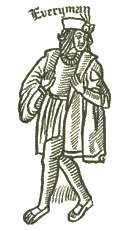To live and suffer alike.

The suffering of Jesus Christ during his crucifixion is much more present throughout literature than one might initially think. In texts like Everyman and Doctor Faustus we see numerous examples of how characters can go through suffering similar to that of Jesus, especially when it comes to how the main characters are interacted with. For the sake of not encasing all of suffering into one paper, I will classify the suffering found in Everyman and Doctor Faustus specifically as emotional suffering. Emotional suffering in Christ can be found in the neglect that Jesus went through. This is most apparent when he asks God why he had been forsaken, and when Peter betrayed him by denying him. The main characters in both texts commit to Christi Imtatio because of how the suffering occurs in both texts and how it has to do with the interaction of characters.
Everyman

The emotional suffering in Everyman is most apparent when Everyman asks Fellowship “Will thou forsake me?” (565). While similar to Jesus, who asked God “Why hast thou forsaken me?” the response of Fellowship is almost happy (Psalm 22:2). While Everyman is “sore” of the heart, Fellowship’s faith overtakes the loyalty to his friend. The background of Fellowship being a good friend to Everyman but denying him his company is reminiscent of that of Peter, who had denied Jesus three times. Later, Cousin even states that they have an “unready reckoning”, Kindred chooses to “abide behind”, and Goods says “I cannot be sad” (Lines 375, 366 and 456). This makes every character that denies Everyman their company as Peter figures, and in tandem Everyman as a Jesus figure. The emotional suffering of being denied three times before meeting Good Deeds bears much resemblance to the suffering of Jesus and his crucifixion.
Doctor Faustus

In Faustus, we see a moment of emotional suffering when Faustus is being forsaken by God. While not present in the scene, God is talked about by Scholars 1 and 2 when they speak of God’s presence throughout Faustus’ suffering: “we will pray, that God may have mercy upon thee” (Line 57). If we were to take God’s presence as literal, and to assume that they were present throughout much of the play, we could then assume that God had forsaken Faustus in the very end as he is pulled into hell by Mephistopheles. While this bears similarities to Psalm 22:2, the difference is that Jesus had never forsaken God and Faustus had. During his time of moral balancing he says to the good angel “resolve me of all ambiguities” (Line 80). This is interesting for two reasons: one, this similar to Lady Macbeth when she says “unsex me here” which is largely accepted as a moment of asking to be apart from that of a moral human being, and if we were to take this same interpretation here then two, it would make Faustus inhumane in the face of God (Line 47). While this is different to the life of Jesus, the death of Faustus being dragged into hell asking God to “at last be saved” is similar to that of Jesus in Psalm 22:2 (Line 93). The questions of being forsaken by God by both Jesus and Faustus and for the most part dying unanswered parallel each other.
The similarities to Jesus Christ, through suffering in these texts implicate a much larger question of how we view suffering as a general subject. Jesus is most certainly a symbol of suffering as much as he is a symbol for peace, and what both Doctor Faustus and Everyman seem to tell us is that we can’t have one without the other. They both seem to harken back to the death of Jesus and tend to imitate a specific way in which he suffered. It is only after he is denied three times that Everyman is met with Good Deeds, and it is when Faustus is forsaken by God during his punishment is the audience then at peace with his fate. Both authors seem to delicately weave both peace and suffering together in their own respective plays, and incidentally it is also what makes them so similar. This also implies that suffering in many other texts can be interpreted as imitating Christ. Faustus and Everyman are two characters separated by nearly a century and yet both harken back to the death of Jesus Christ in way of suffering. While these two texts might tell us how people back then might have viewed suffering, I’m curious to see what we have come up with since then.
Works Cited
- Marlowe, Christopher. Doctor Faustus. The Norton Anthology of English Literature: The Sixteenth Century to The Early Seventeenth Century, general editor, Stephen Greenblatt, 10th ed, Norton, 2018, pp 680-715
- Everyman. The Norton Anthology of English Literature: The Middle Ages, general editor, Stephen Greenblatt, 10th ed, Norton, 2018, pp 558-580
- Shakespeare, William Macbeth. Simon and Schuster Paperbacks NY, New York. 2013. Print.